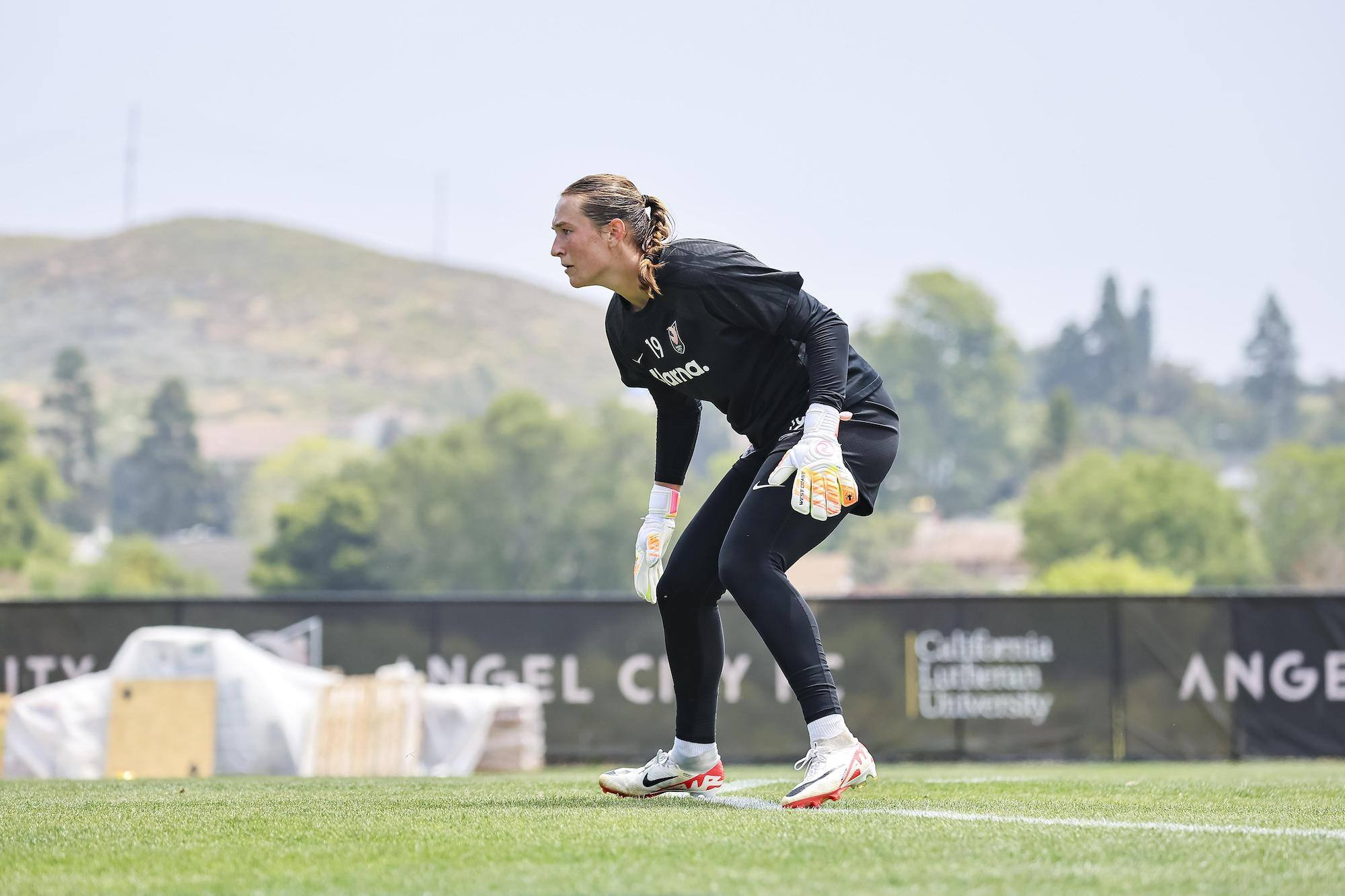
Welcome to The Breakdown, where Angel City players break down the basics of the game to help you understand what they do on the pitch. This week, we talked to goalkeeper Angelina Anderson.
AngelCity.com: Goalkeeping can be a very misunderstood position, because your most important job seems so obvious, but you do a lot more than just make saves. So what are a goalkeeper’s responsibilities?
Angelina Anderson: Our main job is to keep the ball out of the net, that’s priority number one. But it's a lot more complicated than that. In possession—so when your team has the ball—you often start the attack off, and have to be very decisive and clean, and kind of a playmaker at times. Out of possession, you’re keeping the ball out of the net, but there are so many minute details that go into it, like your positioning—you can be like, half an inch off, or have the wrong hip angle, and you're not going to save the ball.
ACFC: Obviously you’re not just standing around waiting for a shot to happen—you do a lot to set yourself up before that happens. Tell us about that.
AA: I would say positioning is a huge part of your success before you can even start to move to make a save. Your positioning vertically on the field depending on where the ball is, and also side-to-side in the goal. The angle you take for the shot is really important, and then you have to think about which direction you’re going to dive. So there's a lot that goes into it, but position is probably the foundation of your success.
And if you're out of position—which you will be every now and then—then you have to get in the best position that you can in the time that you have.
ACFC: Say a little more about what you do in possession.
AA: Your main focal points are your angles of support—which is the angle I'm showing to the person with the ball so I can be a passing option for them—and also just the quality of pass and the decision of which pass you play. That's very dependent upon the other team’s positioning, like, how many forwards do they have pressing us?
Sometimes as a goalkeeper, you'll play a simple pass to see where or how they move, and then you can reposition to find what that opens up. For example, we’ll go short to kind of draw them out, open up space, and play around them in our buildup. Often that can look like just a really simple, short pass from the goalkeeper, but you have to make sure it's sharp and the ball speed is correct and that it's to the right foot, or else everything can kind of break down. And then even after you kick the ball, where do you move to support?
ACFC: What’s a goalkeeper’s job on corner kicks?
AA: You're kind of like the commander. We have a very specific setup on a corner kick, and everybody helps out, but you’re making sure that everyone is in the right spot. And then I think my actions as a goalkeeper on a corner kick are, first, I have to judge if the ball is going to be an outswinger, going away from the goal or an inswinger, when the ball comes towards the goal, and that affects my positioning and how the defense is positioned. If it's an inswinger, I need to be a little closer to my line because there's a chance it could be coming closer to the goal.
At that point it's just about judging the flight of the ball and making a quick decision on whether to claim it myself. Like, is that in my range? And if it is, you have to “go be the hammer, not the nail”—that's what my dad always used to tell me.
ACFC: One thing that’s unique about the keeper is they can see the whole field at all times. What responsibilities do you have around that?
AA: You’re kind of like a coach on the field—so when you see something, you have to make sure you say it.
I also think a big part of being a goalkeeper that goes unrecognized is problem solving before anything even happens. My college coach used to tell me that all the time—you can make a save before the ball's even near you by coaching and moving people around and letting people know where players are and things like that. You’re just being really alert to danger and calling it out. Maybe you see something that another player can't see on the field and you move them two steps, and then they make an interception. That's a big moment that could have turned into something bad.
ACFC: What else is unique about your position?
AA: Psychologically, I think just being able to stay mentally switched on throughout the whole game. You might not get that much action for 20 minutes and then like, have to make a worldy and save the game.
Then the flip side is, sometimes you lose the game for the team. There's no one behind you to pick up your slack. So I think goalkeeping can be a little lonely in that regard. You have to be really psychologically resilient.

